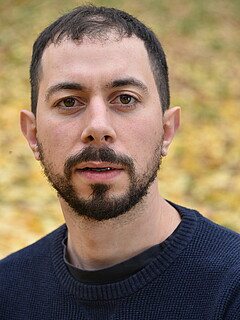PhD students 2nd cohort

Dr. des. Max Ischebeck
Friedrich-Schiller-University Jena
Research Training Group "The Romantic Model"
Curriculum Vitae
Max Ischebeck (born 1985) studied sociology from 2007 to 2012 at the Ludwig-Maximilian-Universität in Munich, majoring in cultural sociology and gender studies. During his studies, he was employed at the chair for Social Inequality. In 2013 he studied Jazz majoring in guitar at the Conservatorium Maastricht. In 2014 he moved to the Hochschule für Musik Saar where he got his degree in 2018. The Iso-Institut für Sozialforschung und Sozialwirtschaft e.V. in Saarbrücken employed him during that time. He won fellowships from the Studienstiftung des Deutschen Volkes and the Yehudi Menuhin, Live Music Now-Foundation, respectively.
PhD project
Music and Body Meaning. Exploring Specific Social Functions of Musical Practices in the Romantic Period and in the Present Time
What is the social importance of music? From a social theoretical point of view, this idea is obvious. However, from an empirical perspective, it poses significant difficulties. Music is extremely varied as are its applications and its connections to different social areas. Therefore, the strategy of this thesis is to focus on the early romantic period. During that era, music underwent a drastic change, as did its performance, reception, and aesthetic perceptions.
Following the concepts of the new phenomenology, the premise is that music can be a means to reflect and create body meaning and body knowledge. During the romantic period, this potential was significantly developed along with musical forms and practices of listening. The post-structuralist theory of subjectivity offers a second proposal. Around 1800, listening to music was a self-technique and was used to delve into specific romantic subjectivity. In this context, the view of music is highly ambiguous. On the one hand, it is supposed to deliver redemption, a universalistic view of the world and immediacy. On the other hand, it is seen as pathological and deceptive. To examine the social impact, meaning and practices of music during the romantic period, a discourse analysis will be conducted.
The thesis will explore how romantic practices have influenced the approach to music until the present times. To examine this, interviews on avant-garde-jazz and popular electronic music will be carried out and interpreted using qualitative documentary methods.
Attributing meaning to acoustic forms is an integral part of musical practices of subjectification and bodily practices. To understand these semantic connections, interpretations of texts and interviews will be combined with a musicological analysis of romantic works, electronic music and jazz improvisations.
Publications
- Der Musikalische Körper als Wunschmaschine: Wilhelm Heinrich Wackenroder und die Bedeutung des Leibes für die gesellschaftliche Wirksamkeit der Musik, in: Hoppe Christine/Avishag Müller Sarah: Music in the Body - The Body in Music. Körper an der Schnittstelle von musikalischer Praxis und Diskurs, Hildesheim, Zürich, New York, 2021, S. 133-154.
- Sektorenübergreifende Hilfen nach Erstdiagnose Demenz im Krankenhaus (Coautor), Saarbrücken, 2016
- Studie zur Situation der Demenznetzwerke in Rheinland-Pfalz (Coautor), Saarbrücken, 2016
- Rezension zu: Peter Seyferth (Hrsg.): Den Staat zerschlagen! Anarchistische Staatsverständnisse, Baden-Baden 2016, veröffentlicht auf: https://www.socialnet.de/rezensionen/21235.php
Presentations
5. 9. 2019 bei der Tagung `Musik im Körper-Körper in der Musik: Körper an der Schnittstelle von musikalischer Praxis und Diskurs´. Vortragstitel: Musik und leiblicher Sinn. Untersuchung spezifischer sozialer Funktionen von musikalischen Praktiken in Romantik und Technokultur